 Vampire Weekend's Surprising Jewish Stories
Vampire Weekend's Surprising Jewish Stories
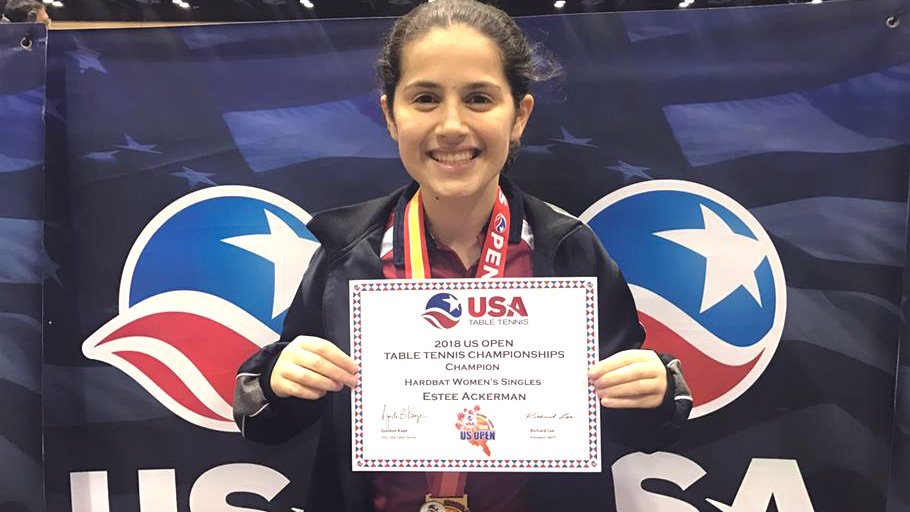

8 min read
Estee Ackerman is aiming for the 2020 Olympics, as long as Shabbat doesn’t conflict. An Aish.com exclusive.
She’s 17-year-old Estee Ackerman, winner of multiple gold medals at the U.S. Table Tennis championships and ranked #22 in the country. She’s the media sensation who, at age 11, beat tennis champion Rafael Nadal in ping pong. And she’s the one profiled in a lengthy article in the New York Times for prioritizing Judaism over sports, refusing to play on Shabbat or Jewish holidays.
Estee’s story begins in the suburban New York town of West Hempstead, Long Island. When she was 7 and her brother Akiva was 10, Glenn Ackerman became concerned with the amount of time his children spent looking at a computer screen. To provide face-to-face bonding time, he bought a fun family activity that didn’t involve electronic gadgets: Ping pong.
Estee’s career began rather innocuously, playing evenings in the basement. “I was so short that all you could see above the table-top was a paddle going back and forth,” she says.
Glenn noticed that paddle swinging exceptionally well, and took Estee to the local table tennis club for lessons.
“As important as being a champion, it's more important that I represent the Jewish people.”
“The first day there, I felt so out of place,” Estee tells Aish.com. “Not only because all the other kids were speaking Chinese and Korean, but I was wearing a skirt and toting my kosher food. I remember thinking: What am I even doing here? And how will I ever reach these players’ level of skill?”
Top coaches recognized Estee’s natural talent: quick reflexes, hand-eye coordination, and agile footwork. After private lessons and persistence, at age 9, she began competing in tournaments.
“Ping pong is not like basketball where size and strength give you a much bigger advantage,” she says. “Ping pong is one of the world’s most popular sports because anyone can play. There’s no expensive equipment, and it’s not age-specific – everyone from young kids to seniors can compete at the highest level.”
Estee also excels at the mental aspects of the game: high concentration and quick thinking. During the furious back-and-forth of championship ping pong, the ball reaches speeds of 50 mph, propelled with enormous spin and power. Game strategy has been compared to something between chess and boxing. “During a match, I’m not focused on anything else but the ball or my opponent,” she says.
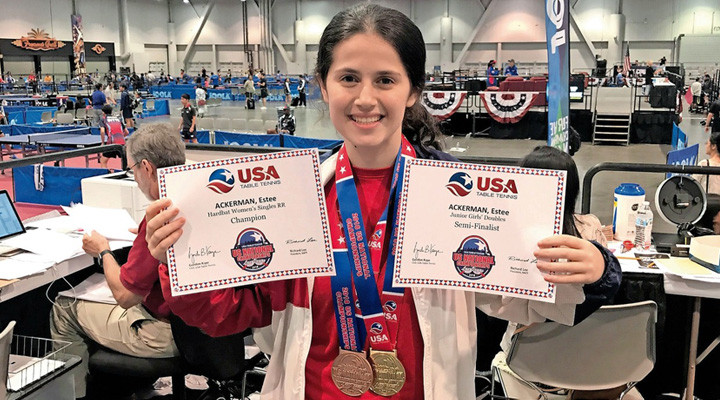 Estee is crowned as US Table Tennis Champion
Estee is crowned as US Table Tennis Champion
Estee leapt onto the national stage in 2013 when, as an 11-year-old, she faced off against tennis star Rafael Nadal in an exhibition match at Grand Central Station in New York. Event producers recognized the fun and drama of pitting a little girl against an elite professional athlete.
Many of Nadal’s best tennis moves – charging the net or a two-fisted backhand – don’t translate to ping pong, and little Estee won the match. (One week later, Nadal “bounced back” and won the US Open Tennis Championship.)
Estee’s effervescence and poise propelled her to a series of TV appearances. This was matched by an upward trajectory in table tennis skills, and at the tender age of 14, Estee earned a coveted spot as one of 16 qualifiers at the 2016 U.S. Olympic trials.
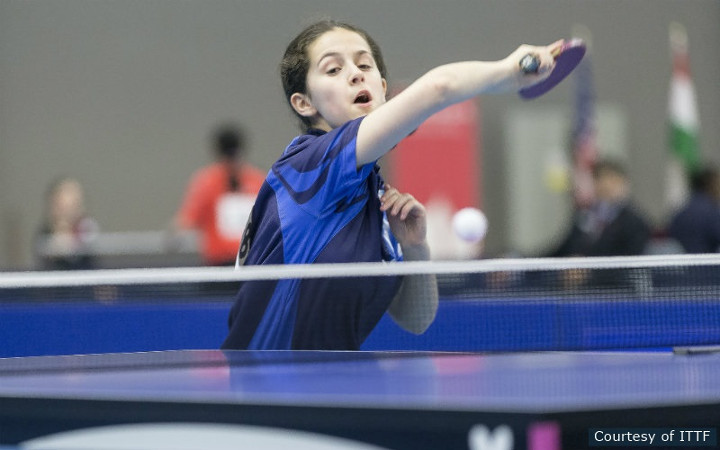
And she did it all while strictly adhering to Torah observance – eating kosher food, and not playing or traveling on Friday nights or Saturday before sundown (as well as certain Jewish holidays). In addition, she maintains a 10-hour school day, while most other elite players are home-schooled and practice 10 hours a day.
For Estee, it’s all a matter of priorities: Judaism #1. Ping Pong #2. School #3.
For Estee, it’s all a matter of priorities: Judaism #1. Ping Pong #2. School #3.
Maintaining the delicate balance isn’t always easy. At the 2012 US National Table Tennis Championships in Las Vegas, an important match fell on Shabbat. When tournament officials would not reschedule it, Estee was faced with a clash of priorities.
“My father left the final decision up to me,” she says. “I’d been training for six months, for hours every day. Any 11-year-old would want a gold medal. Yet even if I could find a halachic (Jewish legal) way around this, I concluded that competing in a national tournament with all the cameras and media is not in the spirit of Shabbat. As important as being a champion, it's more important that I represent the Jewish people.”
Estee’s story received major media attention, with CBS News posting the headline: “11-Year-Old Table Tennis Phenom Chooses Shabbos Over Championship; Estee Ackerman Is Not Only a Great Player, But Also a Highly Principled One.”
Estee notes the irony of choosing Shabbat over sports. “If I would have competed on Shabbat and won, nobody would have given it much attention,” she says.
Best of all, she says, was the flood of emails and calls from people around the country, saying that her story inspired them to greater Jewish commitment. She muses: “Who would have thought that ping pong would lead to such a thing?”
Since then, Estee has found creative ways to accommodate scheduling conflicts. “One time a round-robin event extended into Friday night and Saturday,” she explains. “With the tournament director’s agreement, we tracked down the five other players. They all agreed to play on Friday afternoon, which turned out to be a very packed schedule!”
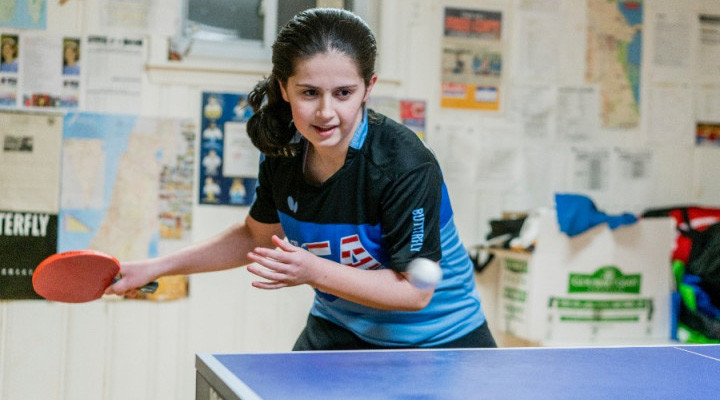 Estee practicing in her West Hempstead basement.
Estee practicing in her West Hempstead basement.
Guiding Estee through this litany of training, travel and sponsorships is her father, Glenn, a funeral director, who accompanies her to all the tournaments. Her mother, Chanie, is an enthusiastic supporter who “runs the show behind the scenes.”
This past December, Estee encountered another unique challenge. The US Open Table Tennis Championship coincided with a Jewish fast day, the Tenth of Tevet. Because Estee would have an entire day (starting at daybreak) without food or water, she shifted her training schedule. “I practiced extra the evening before,” she explains, “then got additional rest during the day, and didn’t warm up before the match – all to conserve energy.”
What Estee might have sacrificed in terms of stamina, she compensated with focus and skill. “As it turns out, not eating or drinking gave me much better focus, a better mentality of fighting for every point,” she says. “Nothing was going to stop me from a gold medal.”
The challenge also produced a heightened spiritual connection. “I truly felt that Hashem was with me on every point,” she says. “I’m very blessed to grow up in a house where the priorities are love of God and Torah, and doing kindness for others. Knowing the ultimate value in life enriches everything else I do.”
Incredibly, Estee won the gold medal – likely the first table tennis champion to do so without food and water.
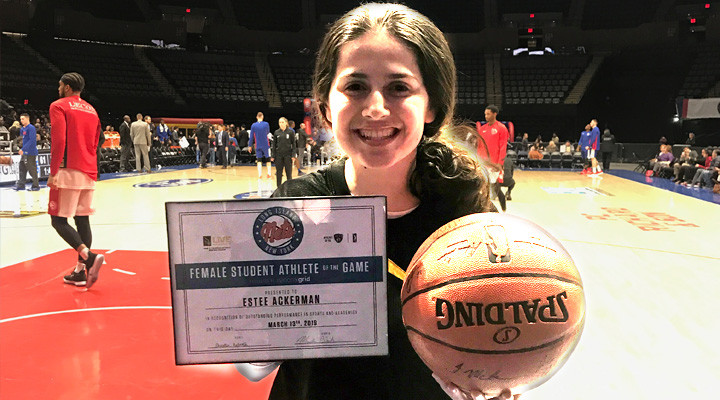 March 2019: Estee honored at a Brooklyn Nets’ NBA game as “Outstanding Student Athlete.”
March 2019: Estee honored at a Brooklyn Nets’ NBA game as “Outstanding Student Athlete.”
Estee’s career continues to skyrocket, culminating a few months ago at the US Open, where she faced off in the gold medal match against Lily Yip, a legendary two-time Olympian who had already won five gold medals that week. The best-of-three series was a nail-biter, with Estee dramatically saving five match points. She finally prevailed 26-24 for the gold medal, making her America’s number one player in the “hardbat” (paddles without padding) category.
Estee is aware that ping pong has negative connotations as a “nerdy basement sport,” as opposed to China, where table tennis is like a national religion. She hopes to become a ping pong ambassador and bring the sport more into the mainstream.
This fall, while continuing her Jewish studies in Jerusalem at Michlalah College, Estee plans to train a few evenings a week to keep her game sharp.
To that end, Estee will be joining top speakers and entertainers this month at a Passover Retreat in Florida – organizing ping pong tournaments and giving inspirational talks. Her message? “Don’t compete for the trophies and medals. Go for your dreams. Put in the time and the effort. Dream big.”
This fall, while continuing her Jewish studies in Jerusalem at Michlalah College, Estee plans to train a few evenings a week to keep her game sharp. Her goal: the 2020 Summer Olympics in Tokyo. Estee will first need to compete at the US Olympic Trials in February 2020, where she is certain to benefit from having 2016 Olympic Trials experience under her belt.
Estee is also pondering the idea of joining the Israeli team, following Marina Kravchenko who represented Israel in ping pong at the 2004 Olympics.
Whatever the case, Estee is committed to keeping her priorities straight. “In this day and age, many people sacrifice their values just to get ahead. But I don’t think that is necessary,” she says. “Judaism will always be my number one priority.”
In the meantime, the accolades keep pouring in. This month, Estee was honored at a Brooklyn Nets NBA game as “Outstanding Student Athlete.” Just another notch in the paddle of one Jewish teenager pursuing her dreams with special finesse.
